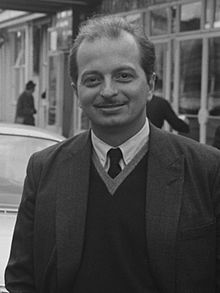Luiz Bonfá
| Luiz Bonfá | |
|---|---|
 |
|
| Background information | |
| Birth name | Luiz Floriano Bonfá |
| Born |
October 17, 1922 Rio de Janeiro, Brazil |
| Died | January 12, 2001 Rio de Janeiro |
| Genres | Brazilian jazz, bossa nova |
| Occupation(s) | Musician, composer |
| Instruments | Guitar |
| Years active | 1940s–2001 |
| Labels | Verve, Dot, Cook, Philips, Epic |
Luiz Floriano Bonfá (17 October 1922 – 12 January 2001) was a Brazilian guitarist and composer. He was best known for the compositions he penned for the film Black Orpheus.
Luiz Floriano Bonfá was born on October 17, 1922, in Rio de Janeiro. He studied in Rio with Uruguayan classical guitarist Isaías Sávio from the age of 11. These weekly lessons entailed a long, harsh commute by train (2 1/2 hours one way) and on foot from his family home in Santa Cruz, the western rural outskirts of Rio de Janeiro to the teacher's home in the hills of Santa Teresa. Given Bonfá's extraordinary dedication and talent for the guitar, Sávio excused the youngster's inability to pay for his lessons.
Bonfá first gained widespread exposure in Brazil in 1947 when he was featured on Rio's Rádio Nacional, then an important showcase for up-and-coming talent. He was a member of the vocal group Quitandinha Serenaders in the late 1940s. Some of his first compositions such as "Ranchinho de Palha", "O Vento Não Sabe", were recorded and performed by Brazilian crooner Dick Farney in the 1950s. Bonfá's first hit song was "De Cigarro em Cigarro" recorded by Nora Ney in 1957. It was through Farney that Bonfá was introduced to Antônio Carlos Jobim and Vinicius de Moraes, the leading songwriting team behind the worldwide explosion of Brazilian jazz/pop music in the late 1950s and 1960s. Bonfá collaborated with them and with other prominent Brazilian musicians and artists in productions of de Moraes' anthological play Orfeu da Conceição, which several years later gave origin to Marcel Camus' film Black Orpheus (Orfeu Negro in Portuguese). In the burgeoning days of Rio de Janeiro's thriving jazz scene, it was commonplace for musicians, artists, and dramatists to collaborate in such theatrical presentations. Bonfá wrote some of the original music featured in the film, including the numbers "Samba de Orfeu" and his most famous composition, "Manhã de Carnaval" (of which Carl Sigman later wrote a different set of English lyrics titled "A Day in the Life of a Fool"), which has been among the top ten standards played worldwide, according to The Guinness Book of World Records.
...
Wikipedia
